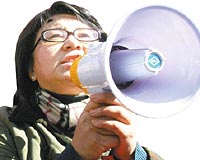
KYRGYZ PARLIAMENT REJECTS FEMALE CABINET NOMINEES, INCLUDING OTUNBAYEVA
Publication: Eurasia Daily Monitor Volume: 2 Issue: 184
By:

On September 30, the Kyrgyz parliament completed the appointment process all 16 cabinet ministers and key members of the new government. The selection process took two rounds, because six of President Kurmanbek Bakiyev’s candidates were rejected in the first round.
Roza Otunbayeva, the primary force behind the March 24 Tulip Revolution, was one of the rejected candidates. The parliamentary rebuff of Otunbayeva was an enormous disappointment, interpreted as the legislature’s payback for her attempts to dismiss the parliament after the revolution.
But Otunbayeva took her defeat stoically, calling it logical and predictable: “I was dead in the existing scheme of power. Alga [party members] won, avenging the [Akayev] Family for [my] trampling the values of Akayevshchina… I was stuck in the throat of some [individuals] who came to the high levels [of the government and parliament] to solve personal problems” (Akipress, September 28).
Along with former prosecutor-general Azimbek Beknazarov, whom Bakiyev unexpectedly dismissed last month, Otunbayeva will become the current government’s strongest critic, if not opponent. “I will join the thousands of ordinary people who participated in the March events across the republic, who did not ask for government positions afterwards, and who today are sick at heart for the wellbeing of the country. We will highlight the key points of the national March 24 Revolution, we will fight to clean up politics,” Otunbayeva told Akipress (September 28).
Parliament also rejected two other female candidates, Alevtina Pronenko and Toktokan Boronbayeva, for minister of labor and social security and minister of culture, respectively. With these three women ejected from the cabinet, there is only one female left in the parliament and executive branch: Aigul Ryskulova, chair of the State Commission on Migration and Employment.
The Coalition for Civil Society and Democracy denounced the parliament’s rejection of the three women as gender discrimination. According to the NGO’s public statement, by rejecting Otunbayeva and Pronenko, parliamentarians are challenging the development of democracy in Kyrgyzstan. The NGO’s statement asks: “Doesn’t yesterday’s voting confirm that some deputies… are professionally useless, capricious, and revengeful – they are not able to think on a state level, placing personal dudgeon in the forefront, [they] do not calculate the reaction of public opinion and the international community” (Radio Azattyk, September 28).
Bakiyev’s nominees for the second round of cabinet appointments are not well known to the wider public. Parliamentarian Marat Sutalinov dismissed them as “such amoebas.” Another parliamentarian, Iskhak Masaliyev, says that the president’s cadres lack experience in politics and have little to present for their political programs: “For three days the candidates walked around parliamentarians’ offices like poor relations. Everyone came, introduced himself, and promised to be an obedient minister. This was the way they campaigned for themselves” (Slovo Kyrgyzstana, October 3).
Along with other politicians, Sutalinov thinks that Bakiyev’s choices are inconsistent, without any solid strategy. The political situation is chaotic, he said. “It is not clear where everyone is moving, gathering: today with him, tomorrow with someone else, someone is offended – he comes here, somebody – there. There is no normal system in the country” (Akipress, September 30). His counterpart Kabai Karabekov thinks that the entire procedure of nominating ministerial candidates was corrupt and followed the old scheme set by ousted president Askar Akayev.
The parliament was also criticized for curtailing reform-oriented candidates. According to local observers, most of the nominees who received parliamentary approval in the first round had worked in the old government, but joined the opposition in the last days of the Akayev regime (Radio Azattyk, September 30).
Bakiyev affirmed a strict attitude towards the new ministers: “If anyone is caught in corruption, I won’t pity anyone, I will take appropriate decisions right away,” said the president. But Daniyar Karimov, a political analyst from Vecherny Bishkek and a strong adversary of the Tulip Revolution, notes “There is not a single state structure left in Kyrgyzstan that wouldn’t raise doubts about own legitimacy” (Kabar, October 1).
The recent assassination of Bayaman Erkinbayev, a prominent member of parliament, indicates the current anxiety about the criminal groups controlling important government decisions (see EDM, September 27). The National Security Service still has not issued any official statements about the possible perpetrators of the three political assassinations since March. At the same time, such politicians as Deputy Prime Minister Adakhan Modumarov and Prime Minister Felix Kulov repeatedly insist that criminality in the country is steadily rising in the aftermath of the revolution.
The past week did see at least one positive development. Adil Toigonbayev, Akayev’s son-in-law, no longer unofficially controls the Vecherny Bishkek newspaper. Toigonbayev had seized the newspaper while it was among the top-rated media outlets in Kyrgyzstan. On September 30, the newspaper’s entire staff openly rioted against the usurper. As of October 3, the newspaper no longer presents rigidly pro-Akayev positions. Yet Akayev still has influence over the KOORT TV channel, which he is obviously trying to use to influence domestic politics.




